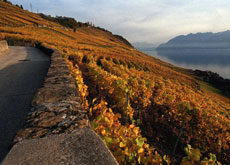
People’s wine goes under the hammer

The city of Lausanne has auctioned more than 250,000 litres of wine from the largest publicly-owned vineyard in Switzerland.
This year’s vintage, which has been described as “exceptional”, went under the hammer last week as part of a tradition dating back almost 200 years.
Lausanne has held a public auction of its wines every second Thursday in December since 1803.
This year 256,000 “ready-to-be-bottled” litres of red and white were divided into 400 lots, ranging from 95 to 3,800 litres each.
Buyers can only use official labels and corks bearing Lausanne’s coat of arms if bottling takes place on the wine estate.
As in previous years, the sale was preceded by two days of wine-tasting – one reserved for the wines of the Côte and the other for those of Lavaux. Interested parties included wine dealers and restaurateurs.
According to oenologist Nicolas Rilliet, the crop of 2002 will be “exceptional”, particularly for the Côte region.
“It will certainly match the grandness of the 2000 vintage, which was peerless,” he told swissinfo.
Thousand-year tradition
The Lausanne region has been producing wine for more than 1,000 years. The first evidence of wine production in French-speaking Switzerland dates from 885 AD, in the areas of Champagne, Corcelles and near Yverdon.
Vines were first recorded in the city of Lausanne around 901 AD. “There were a lot of them inside the city walls,” says Rilliet.
The first estate to fall into public hands was a vineyard owned by the bishop of Lausanne, who ceded it to the Montheron convent in 1141.
He charged the Cistercian monks with clearing the terraces of Dezaley and planting them with vines. During the same period, other monks followed suit at the estate of Faverges at St Saphorin.
Bernese intervention
But following the Bernese invasion in 1536, the Reformation was imposed on the lands of Vaud and the convents’ wealth passed into public ownership.
Lausanne lost its status as capital of the bishopric; as compensation, control of its vast rural estates passed to the city, the Hôpital Notre-Dame and the Bourse aux Pôvres.
This was followed in 1802 by the addition of the Clos de Mont (Mont-sur-Rolle), Burignon (St Saphorin), the Clos des Moines (Dezaley) and finally, in 1838, the Château Rochefort (Allaman).
This resulted in the creation of Switzerland’s largest publicly-owned wine estate.
The 36 hectares produce between 300,000 and 400,000 bottles annually. The oak barrels that are used for vinification come from the woods of Vernand, which also belong to the city.
Pride and joy
The French-speaking Swiss take great pride in their local wines. Other public collectives exist in Vaud, Geneva and Neuchâtel.
Lausanne, though, remains the only major publicly-owned estate – apart from a few wine-producing villages – that sells its wines by auction. The practice, which made its debut in 1803, always goes down well with local people.
“The people of Lausanne are very proud of their products. Restaurants, too, like to mention the best wines on their menus,” says Rilliet.
Prior to the auction, Lausanne said it was expecting a windfall of SFr2.5 million ($1.7 million), which would guarantee the financial health well-being of the estate.
Between SFr200,000 and SFr300,000 is handed over to the city treasury. Lausanne also reserves between 15,000 and 20,000 bottles for itself.
swissinfo, Anne Rubin (translated by Faryal Mirza)
Some 256,000 litres of red and white went under the hammer.
Oenologist Nicolas Rilliet said the crop of 2002 would be “exceptional”.
The Lausanne region has been producing wine for more than 1000 years.
Lausanne said it was expecting a windfall of SFr2.5 million ($1.7 million) from the sale.

In compliance with the JTI standards
More: SWI swissinfo.ch certified by the Journalism Trust Initiative



























You can find an overview of ongoing debates with our journalists here . Please join us!
If you want to start a conversation about a topic raised in this article or want to report factual errors, email us at english@swissinfo.ch.